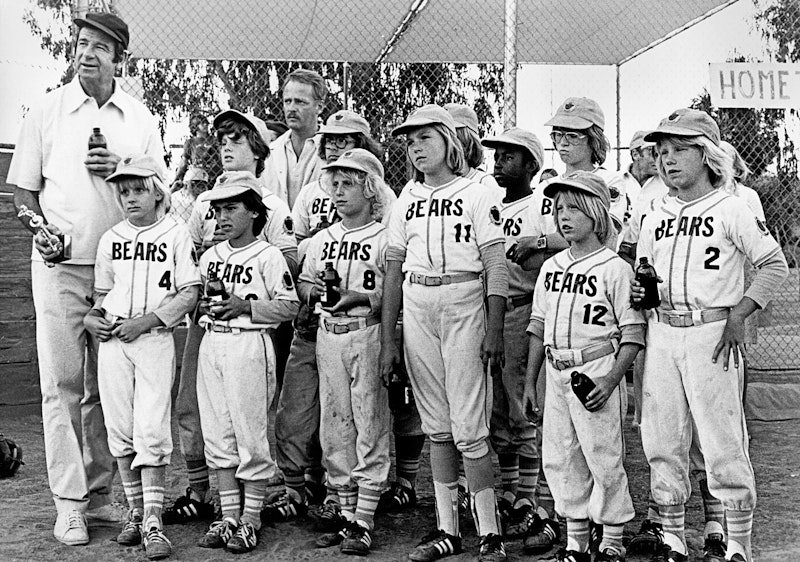American cinema of the 1970s has been picked apart and discussed to death, and so have the safer and more expensive films of the Reagan-1980s. J. Hoberman’s Make My Day traces the devolution of Hollywood from its mid-1970s highpoint—beginning with Nashville and Jaws—through the end of the 1980s. Sprawling, serious, and unclassifiable movies like Nashville were on their way out, and we’ve been living in the world of Jaws and Steven Spielberg ever since. Spielberg owned the 1980s: besides the films he directed himself (Raiders of the Lost Ark; E.T. the Extra Terrestrial; Indiana Jones and the Temple of Doom; The Color Purple; Empire of the Sun; and Indiana Jones and the Last Crusade; and Always), he ghost-directed most of the films produced by his own Amblin Entertainment: Poltergeist, Gremlins, and The Goonies.
Of all his peers, Spielberg is the only one who consistently works with children, makes movies for children, and, by all accounts, has the taste of a child: never reads, junk food, video games. That was the sensibility that took over American entertainment in the 1980s, and besides a brief respite in the 1990s, it’s just gotten dumber and dumber and dumberer. When I was a kid, Spielberg had already moved onto epics like Schindler’s List, Amistad, and Saving Private Ryan; Pixar filled his place, along with the resurgence of quality Disney animation. There was no need for a live action adventure movie starring a bunch of noisy kids like The Goonies when you had Toy Story, The Lion King, Mulan, A Bug’s Life, and yes, Antz (produced by Spielberg’s Dreamworks SKG). The live action kids movies that were made in the 1990s—The Sandlot, Harriet the Spy, Flubber—didn’t have the budgets or the prominence of Spielberg’s work in the 1980s.
Even still, there was nothing like the original The Bad News Bears out in the 1990s, or the 2000s, or the 2010s, or now. Richard Linklater’s pro-forma 2005 remake starring Billy Bob Thornton can only go so far because it stars Billy Bob Thornton in the role originated by Walter Matthau. Thornton can be very good (Bad Santa), but he’s a sleazeball without any of the paternal comfort and strength of a Matthau or, say, Peter Falk. Imagine Falk in The Bad News Bears, chain-smoking and chugging every brand of beer known to man; imagine him up in the tree with Erin Blunt, the one black kid on the team, encouraging him after a brutal loss, reminding him that Hank Aaron made 42 errors in his first game. Falk could’ve pulled it off like Matthau: a genuinely touching moment that never veers into the sentimental or didactic.
And this is after one of the kids says every slur in the book, and another echoes exactly what he said. If The Bad News Bears isn’t being revived, licensed, or streamed as much as it should, it’s because of this moment early in the movie. Of course the movie isn’t racist, it’s just kids being kids, and the language is realistic for the mid-1970s. Kids love saying bad words, but this isn’t something you’ll ever see in a movie made after the 1980s. In The Bad News Bears, the kids are living in the world, our world, and in The Goonies, they’re searching for treasure, fighting pirates, a fantasy. Naturally they win in the end, while the Bears lose; the studio did their best to convince Stanley R. Jaffe and Michael Ritchie to let them win, but no, the whole point was that they lost and gained a confidence they never had.
That’s just too complicated and real for Corporate American Cinema. Spielberg’s grand adventures created a generation of permanent children, a cohort who are still being catered to (The Goonies is being remade next year—will the 1980s ever end?) I welcome the anarchy and aesthetic overload of A Minecraft Movie over the deceptively handsome adventure movies that moved children out of the real world and into perpetual daydreams, their only reference to the outside world the brands they like. If the Goonies were a baseball team, they’d be sponsored by Baby Ruth; the Bears will always be sponsored by Chico’s Bail Bonds.
—Follow Nicky Otis Smith on Twitter: @MonicaQuibbits

